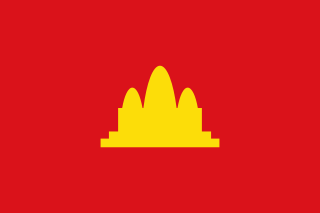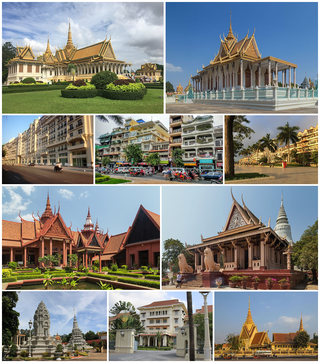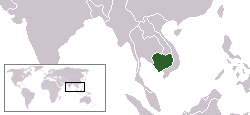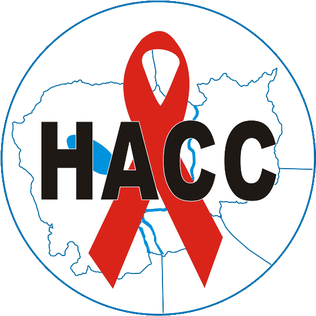Related Research Articles
The history of Cambodia, a country in mainland Southeast Asia, can be traced back to Indian civilization. Detailed records of a political structure on the territory of what is now Cambodia first appear in Chinese annals in reference to Funan, a polity that encompassed the southernmost part of the Indochinese peninsula during the 1st to 6th centuries. Centered at the lower Mekong, Funan is noted as the oldest regional Hindu culture, which suggests prolonged socio-economic interaction with maritime trading partners of the Indosphere in the west. By the 6th century a civilization, called Chenla or Zhenla in Chinese annals, firmly replaced Funan, as it controlled larger, more undulating areas of Indochina and maintained more than a singular centre of power.

The Khmer Rouge is the name that was popularly given to members of the Communist Party of Kampuchea (CPK) and by extension to the regime through which the CPK ruled Cambodia between 1975 and 1979. The name was coined in the 1960s by then Chief of State Norodom Sihanouk to describe his country's heterogeneous, communist-led dissidents, with whom he allied after his 1970 overthrow.

Phnom Penh is the capital and most populous city of Cambodia. It has been the national capital since the French protectorate of Cambodia and has grown to become the nation's primate city and its economic, industrial, and cultural centre.

Cambodia or Kampuchea, officially the Kingdom of Cambodia, is a country in the southern Indochinese Peninsula in Southeast Asia, spanning an area of 181,035 square kilometres, bordered by Thailand to the northwest, Laos to the north, Vietnam to the east, and the Gulf of Thailand to the southwest. The capital and largest city is Phnom Penh.
The early history of Cambodia follows the prehistoric and protohistoric development of Cambodia as a country in mainland Southeast Asia. Thanks to archaeological work carried out since 2009 this can now be traced back to the Neolithic period. As excavation sites have become more numerous and modern dating methods are applied, settlement traces of all stages of human civil development from neolithic hunter-gatherer groups to organized preliterate societies are documented in the region.

The Cambodian Civil War was a civil war in Cambodia fought between the forces of the Communist Party of Kampuchea against the government forces of the Kingdom of Cambodia and, after October 1970, the Khmer Republic, which had succeeded the kingdom.

Ratanakiri is a province of northeast Cambodia. It borders the provinces of Mondulkiri to the south and Stung Treng to the west and the countries of Laos (Attapeu) and Vietnam to the north and east, respectively. The province extends from the mountains of the Annamite Range in the north, across a hilly plateau between the Tonlé San and Tonlé Srepok rivers, to tropical deciduous forests in the south. In recent years, logging and mining have scarred Ratanakiri's environment, long known for its beauty.

The Third Indochina War was a series of interconnected armed conflicts, mainly among the various communist factions over strategic influence in Indochina after Communist victory in South Vietnam, Laos and Cambodia in 1975. The conflict primarily started due to continued raids and incursions by the Khmer Rouge into Vietnamese territory that they sought to retake. These incursions would result in the Cambodian–Vietnamese War in which the newly unified Vietnam overthrew the Pol Pot regime and the Khmer Rouge, in turn ending the Cambodian genocide. Vietnam had installed a government led by many opponents of Pol Pot, including former Khmer Rouge most notably Hun Sen. This led to Vietnam's occupation of Cambodia for over a decade. The Vietnamese push to completely destroy the Khmer Rouge led to them conducting border raids in Thailand who had provided sanctuary.

The Cambodian–Vietnamese War, known in Vietnam as the Counter-offensive on the Southwestern border, and by Cambodian nationalists as the Vietnamese invasion of Cambodia, was an armed conflict between Democratic Kampuchea, controlled by the Khmer Rouge, and the Socialist Republic of Vietnam. The war began with repeated attacks by the Liberation Army of Kampuchea on the southwestern border of Vietnam, particularly the Ba Chúc massacre which resulted in the deaths of over 3,000 Vietnamese civilians. On 25 December 1978, Vietnam launched a full-scale invasion of Kampuchea, and subsequently occupied the country and removed the government of the Communist Party of Kampuchea from power.

Lesbian, gay, bisexual, and transgender (LGBT) persons in Cambodia face legal challenges not experienced by non-LGBT residents. Same-sex sexual activity is legal in Cambodia. Cambodia provides no anti-discrimination protections for LGBT people, nor does it prohibit hate crimes based on sexual orientation and gender identity.
Operation Freedom Deal was a United States Seventh Air Force interdiction and close air support campaign waged in Cambodia between 19 May 1970 and 15 August 1973, as an expansion of the Vietnam War, as well as the Cambodian Civil War. Launched by Richard Nixon as a follow-up to the earlier ground invasion during the Cambodian Campaign, the initial targets of the operation were the base areas and border sanctuaries of the People's Army of Vietnam (PAVN) and the Viet Cong (VC).
Veal Veng, Khmer: ស្រុកវាលវែង, is a district in Pursat Province, Cambodia. The district capital is Pramoey town located 109 km (68 mi) by road from National Highway Number 5.

The Extraordinary Chambers in the Courts of Cambodia, commonly known as the Cambodia Tribunal or Khmer Rouge Tribunal (សាលាក្ដីខ្មែរក្រហម), was a court established to try the senior leaders and the most responsible members of the Khmer Rouge for alleged violations of international law and serious crimes perpetrated during the Cambodian genocide. Although it was a national court, it was established as part of an agreement between the Royal Government of Cambodia and the United Nations, and its members included both local and foreign judges. It was considered a hybrid court, as the ECCC was created by the government in conjunction with the UN, but remained independent of them, with trials being held in Cambodia using Cambodian and international staff. The Cambodian court invited international participation in order to apply international standards.

The People's Republic of Kampuchea (PRK) was a partially recognised client state in Southeast Asia supported by Vietnam which existed from 1979 to 1989. It was founded in Cambodia by the Kampuchean United Front for National Salvation, a group of Cambodian communists who were dissatisfied with the Khmer Rouge due to its oppressive rule of Cambodia and defected from it after the overthrow of Democratic Kampuchea, Pol Pot's government. Brought about by an invasion from Vietnam, which routed the Khmer Rouge armies, it had Vietnam and the Soviet Union as its main allies.

The structure of social class in Cambodia has altered several times throughout its history. The traditional hereditary elites were marginalised in the 1970s, when military leaders gained prominence, before the Khmer Rouge attempted to dramatically eliminate existing class structures in the late 1970s. Since the emergence of peace in the early 1990s, social inequality has increased in Cambodia.
Cambodia does not recognize same-sex marriage or civil unions, but does recognize a registry program known as "declaration of family relationship", offering limited legal rights. As of June 2021, the registry has been introduced in 68 communes. Same-sex marriage has received support from King Norodom Sihamoni and his late father, King Norodom Sihanouk.

HIV/AIDS Coordinating Committee (HACC) (គណៈកម្មការសំរបសំរួលប្រយុទ្ធនឹងជំងឺអេដស៍) is an HIV/AIDS Cambodian NGO network, representing over 120 NGOs working with HIV/AIDS in Cambodia. It was established in 1993 to coordinate civil society organizations and to promote the sharing of information, experiences, and advances from the field among civil society organizations in responding to HIV/AIDS in Cambodia.

Cambodian genocide denial is the belief expressed by some Western academics that early claims of atrocities committed by the Khmer Rouge government (1975–1979) in Cambodia were much exaggerated. Many scholars of Cambodia and intellectuals opposed to the U.S. involvement in the Vietnam War denied or minimized reports of human rights abuses of the Khmer Rouge, characterizing contrary reports as "tales told by refugees" and U.S. propaganda. They viewed the assumption of power by the Communist Party of Kampuchea as a positive development for the people of Cambodia who had been severely impacted by the Vietnam War and the Cambodian Civil War. On the other side of the argument, anti-communists in the United States and elsewhere saw in the rule of the Khmer Rouge vindication of their belief that the victory of Communist governments in Southeast Asia would lead to a "bloodbath."

The Cambodian genocide was the systematic persecution and killing of Cambodian citizens by the Khmer Rouge under the leadership of Communist Party of Kampuchea general secretary Pol Pot. It resulted in the deaths of 1.5 to 2 million people from 1975 to 1979, nearly a quarter of Cambodia's population in 1975.
References
- ↑ SPM Consultants (2006). "Civil Society and Uncivilised Politics: Trends and Roles of the Cambodian Civil Society and Possibilities for Sida Support. The Eighth Report of the Sida Advisory Team (SAT) on Democratic Governance in Cambodia" (PDF). Archived from the original (PDF) on 2007-06-09. Retrieved 2018-10-29.